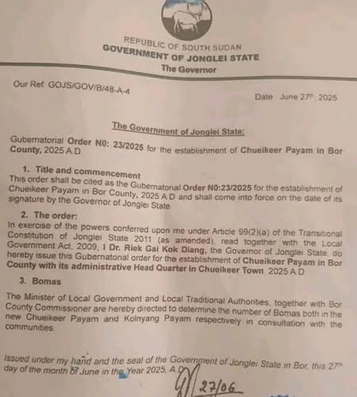The recent creation of Chueikeer Payam, a new administrative unit carved from Kolnyang Payam in Jonglei State’s Bor County, has been met with mixed reactions among local leaders.
Some have welcomed it as a step toward development, while others warn it is a premature move amid unresolved communal conflict.
Governor Riek Gai Kok announced the formation of Chueikeer Payam on 27 June through a gubernatorial order, marking a major administrative reshuffle in one of Bor County’s most populous areas.
Gabriel Manchol Anyang, chairperson of the Kolnyang Payam Community, welcomed the decision, calling it a “timely and strategic” development.
“We believe this new payam will be instrumental in fostering peace and generating much-needed employment opportunities,” he told Radio Tanazuj during an interview. “Kolnyang was previously the largest payam in Bor County, and this division will allow for more focused governance and development.”
However, not all community leaders share his positivity.
Jacob Kur Mareng, a chief of the Nyara community, voiced strong opposition, calling the move inappropriate and potentially destabilizing.
“It is premature to form a new payam before the various Abii communities achieve full reconciliation following a recent communal conflict,” he stated. “This must take precedence, including the enforcement of a court ruling related to that conflict and compensation for those who lost their lives.”
The conflict in question centers on a long-standing dispute over the naming and ownership of a village along the Nile within Kolnyang Payam. Tensions erupted in December 2017 and escalated in February 2018, involving four clans of the Abii community: Nyara, Nyichak, Biong, and Mach-Ayiel.
The violence, sparked by disagreements over whether to retain the village name Panwel or change it to Anuet, resulted in at least 38 deaths, 26 injuries, and the destruction of several villages.
In May 2021, the High Court in Bor convicted 78 individuals for their roles in the clashes, including charges of incitement and direct involvement in the violence. However, the implementation of the ruling has been delayed, fueling grievances among affected communities.
“Without addressing the pain and loss from the past, any new administrative structure risks being built on a fragile foundation,” Chief Kur warned.
The creation of Chueikeer Payam now places renewed attention on the government’s handling of local grievances and whether the move will promote unity or deepen existing divides.




